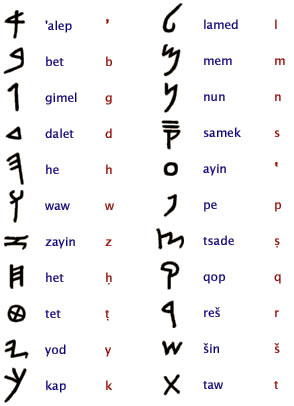Sacred Name Questions Received

We Answer Your Questions on the Divine Name!
Sacred Name Expositors is a research ministry examining the Biblical Divine Hebrew Sacred Names. We treasure our Messiah and are eager to share our faith with you! We hope that you enjoy learning more about the Divine Names from the information presented on this website. Feel free to send us questions, comments or suggestions. Perhaps your question may help others as well, so do not be afraid to ask! We invite you to participate. Yah bless!!
Divine Nicknames???
Subject: |
Names |
Message: |
Hi I am wondering about the origin of a name. For example the name Elijah which starts with the first three letters Eli, There are also many other names starting with Eli. My question is going back as far in language as you have knowledge of, was Elijah first? Thus creating the nickname Eli. I think this has to be answered by a Bible expert. I have gotten answers from both sides that is why I am searching for a person or persons that know the answer for sure, not just opinion. Thank-you. -M.J., Pennsylvania |
Matthew,
El is a title for "God", and Eli means "My God." It is not a nickname. These terms are very old. Yah or Jah is a short form for Yahu or Yahuah (capitalized as LORD or JEHOVAH in the KJV), and came later (see Exodus 6:3), as also did various combinations, such as "Elijah." I do not understand the importance you place upon knowing which combination came first, which may in fact be impossible to determine for certain.
Sources for the Sacred Name:
Subject: |
The name Yahweh |
Message: |
could you send me some sources that say Yahweh is not the correct name from both scholary and non - scholary sources. -R.R., Kentucky |
Robert,
We have a growing list of sources that show this. All of our sources are listed on the Sacred Name website with full documentation and page numbers. This information was hand copied from original sources at major libraries of the world, including the British Library in London, where a return trip for more research is planned for late September into October. We do not possess original copies; if you need that you will have to visit any major city library or university library, or use interlibrary loan. Additonal research will be added in the future so check back at the website periodically. Thanks for your interest in Biblical truth! Yah bless. http://sacred-name.info
Mistaken Advice:
Subject: |
Advice |
Message: |
you should not be calling Our God yah, this is incorrect and a blasphemy. |
Richard,
- If it is blasphemy to use the name "Yah" then many Biblical kings and prophets must have been blasphemers in your opinion, because the theophoric Divine Name was used in their own names extensively, especially prior to the Babylonian captivity. For example, Isaiah's name in Hebrew was Ishiyahu, Jeremiah's name was Yeremiyahu, and so forth. See the articles on this website. The use of "Yah" in biblical names goes back at least to Moses' mother, known as "Jochebed" in our popular English Bibles, but Yahu-chabod (God/Yahu is my Glory) in Hebrew. Just because modern custom uses forms such as "Jesus", "God", "Lord," and the like does not make it either correct or original. Incidentally, the word, blasphemy", comes from Greek, not Hebrew, origin. The American Heritage Dictionary defines it as, "An irreverent or impious act, attitude, or utterance in regard to something considered inviolable or sacrosanct." It is not irreverent to refer to our Heavenly Father by the Name He gave us, nor is it an impious utterance. To the contrary, it is impious and irreverent to refer to Yahu(ah) by pagan or corrupt names! Sad to say, false traditions today are too often considered sacrosanct and inviolable. The Bible tells us the opposite!
The Paleo-Hebrew Script:
Subject: |
Old Hebrew |
Message: |
I have heard of the term, Old Hebrew. Can you show me what it is? Thanks, Andrew, Florida |

Another Scholarly Source:
Subject: |
The Name |
Message: |
Message: CJ Koster in his book "Come Out of Her My People" explains on page 1 of chapter 1 (figure 1) The Name of our heavenly in the Hebrew Scriptures is best transliterated as IaHUeH, according to the Oxford English Dictionary (see under Jehovah). And read from the Hebrew it would represent YAHU-EH or YAHU-WEH. Really enjoyed and learned much from your article "Better Covenant." I would like to have your thoughts re: CJ Koster's explanation. |